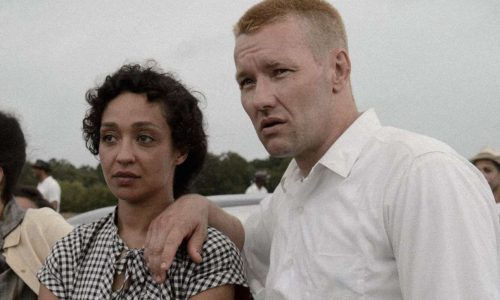
The easiest time for the press to see films is the 0830 screening. Easy in the sense of the shortest queues, guaranteed entry and nothing else going on to clash with. Not so easy in the sense that many journalists will have been out until the early hours and then had to come back to write their articles, before heading back to the morning screening having had only a couple of hours sleep. And not so easy, because the snacks that you fill your bag with because you haven’t had time for breakfast are stolen by the heightened security at the entrance, presumably in case you try to carry out a terrorist attack with a cereal bar and half a pack of raisins. My protest, this morning, was met with the suggestion that I could leave them on the grass somewhere outside and hope they were still there when I returned, so I hid them behind a magazine kiosk and crossed my hungry fingers before mounting the red carpet of the Grand Theatre Lumiere to watch the Official Competition entry by Take Shelter‘s Jeff Nichols, Loving.

Along with the recent Selma, this is one of those films about America’s race relations problem of the mid twentieth century that makes you want to shout at the screen, because the injustice seems so staggering. Opening in the US state of Virginia in the late 1950s, Richard (Joel Edgerton, almost unrecognisable with a bleached-blond crew-cut and almost constantly gurning) is in love with a black woman, Mildred (Ruth Negga). Inter-racial marriage is illegal in their state so they travel to Washington DC to get married and when they return, they’re arrested in the middle of the night and thrown into prison. The film charts the real-life legal battle that lasted a decade, in which two young civil rights lawyers took their case all the way to the Supreme Court. The story is necessarily slow and quietly told with a brooding sense of despair, aided by Edgerton’s underplayed protagonist, more sparing with his words than almost any leading character in modern-day cinema. That you could be thrown in prison for simply being married to someone whose skin is a different colour, just fifty years ago, makes you realise just how much the world has changed in such a relatively short time. The subject matter is particularly topical at a time when a number of American states are currently grappling with discrimination cases relating to sex and sexuality.

The next film of the morning couldn’t have contrasted more in scope with this low-key, intimate drama. Giant was a six minute film designed to showcase new Virtual Reality technology from HP. A couple and their daughter are trapped in their basement as bombs are being dropped on their house from above; the parents try to ease their daughter’s fear by telling her that the bangs are the footsteps of a giant who’s come to play with her. The story – and to be fair – the acting is less than spectacular, but the technology is as eye-popping as it is ground-breaking. Three people watched it at a time, each wearing a VR headset. The image wrapped all around, as well as up and down. You could lean forward and see into boxes on the floor of the basement or read magazines that were piled up in front of you. And when the girl notices a toy rabbit, you can look behind you to see it. The journalist sitting beside me had wanted to explore more but said afterwards that he had been worried about bumping into me. There’s no doubt that this is an experience but whether it will have a future in commercial cinema is open to question – it’s a step on from 3D, but even that hasn’t particularly caught on in all quarters. As a story-telling tool, it gets in the way of the narrative, as you take your mind off the dialogue to explore the environment and look behind you. In a traditional film, the director would make you look at the girl as she spots the rabbit and then cut to the audience to show them, before returning to the girl – in VR, the viewer decides when to turn round to look at the rabbit and how long to look at it – so it’s quite possible that you could then miss important things that are going on in front of you again. It’s impressive to behold but a lot of work will need to be done to find the right project for this to work in any context other than computer games.
Next it was off to curtailed meeting at the Plage Royale beach restaurant with sales agent and film financier Phil Hunt, from Bankside Films and Head Gear Films. With Cannes being Cannes, things come up and he didn’t have long, but we had time for the obligatory chat about the effect Brexit might have on the British film industry. Was he worried? “No,” he laughed confidently. “Because it won’t happen.” But like many of the industry insiders I’ve spoken to about the subject, he’s confident that whatever happens, film-makers will just get on with what they have to do, and if one opportunity for financing or sales closes, they’ll find another one. Another sales agent, Moviehouse Entertainment, have set up shop in the same beach-front restaurant so I couldn’t resist asking them for their thoughts. Head of Acquisitions Mark Vennis said many in his profession were worried about EU plans to create a single market for intellectual property, which would mean they could no longer strike separate deals with each country. Although distancing himself from similar recent comments from Iain Duncan Smith, he was clear that this proposal would favour large studios over small independent companies. Other producers, though, have expressed their fears that a Brexit could reduce the public funding available to them and make it more difficult to work alongside their European counterparts. When I spoke to her yesterday, one such film-maker, Ken Loach’s producer Rebecca O’Brien remarked, “We’d be bonkers to Brexit!”
During the obligatory visit to the UK Film Centre, to check in to see who’s around, I bumped into film critic Jason Solomons and asked him whether I was the only critic not to love Ken Loach’s I, Daniel Blake. “Probably the only British one!” he laughed, before likening the bureaucracy of the job centre to a fall-out with BT. “But you didn’t make a film about that, did you?” I retorted.
Then came a rather unconventional invitation for lunch – or more accurately, to watch a friend eat his complimentary three-course lunch on a neighbouring beach.
Next, it was off to the Grand Hotel for a catch-up with Nick Hirschkorn from Feel Films, who was here last year promoting his BAFTA-winning BBC One magical TV drama Jonathan Strange and Mr Norrell. This year he was back in Cannes with his film hat on, putting together the final elements of his next two projects. Perhaps out of politeness, he also asked about my own film-making activities. One script after another has stuttered to a halt for one reason or another. I regard them as reasons, others might regard them as excuses. Nick’s firm advice – on hearing about the obstacle to this and the problem with that? Just get a script finished. Obvious as it seems, hearing it from him might just be the kick I need.
Then I popped next-door to the Marriott to catch up with Creative Scotland’s Media Relations Manager to find out her latest news, more of which tomorrow.

Next it was back to the market to accompany first-time feature director Brian Barnes around the Riviera exhibition hall to find suitable sales agents to pitch his completed genre project The Redeeming to. Having been at Cannes with Brian several years ago when he was selling a short film, the difference when you have a completed feature to sell is palpable. Agents want to speak to you. Having eyed up posters on the stands to find a company that appears to be a good match for The Redeeming, he approaches with the simplest of pitches – are they acquiring at Cannes this year? – are they acquiring psychological thrillers? – do they do micro-budget – generally recognised in the UK as being below £150,000 – the point being that the cost of promoting and marketing a feature film is so high, that under the model used by some companies, if the film didn’t cost much to make, it’s unlikely to sell for much, so the marketing cost can render an otherwise affordable film unmarketable. If the answer to all three is “yes,” the iPad comes out and they’re invited to watch the trailer. Those who are still interested can then be sent a viewing link by email – so much easier and cheaper than the recent model of handing out DVDs, which film-makers had had to haul to Cannes and sales agents would have to haul back to their offices.
After dinner, the plan was to stop off at one of the more unusual evening events – Mark Vennis from Moviehouse was playing in a band at a gig at a local Irish pub. On arrival though, rather than finding a band – or indeed any music of any sort – we found an English-language film-related pub-quiz. It was only a later meeting with another film-maker that confirmed that the band had been in a continuation of the same pub next door.

Instead, it was back to the Debussy Theatre, to add another screening from the Un Certain Regard contest to the list – David Mackenzie’s Hell or High Water. More commercial and narratively coherent than most films in this segment, it features Jeff Bridges as a west Texas local law officer, hunting a pair of bank robbers, who turn out to be brothers (Chris Pine and Ben Foster) who are trying to raise enough money to stop their house being repossessed after their mother’s death. Introducing the film, the director noted that he was an Englishman, yet the film was a completely American production – he said he thought a European director could offer an outsiders’ eye and he certainly does bring a handful of observations to the fore that could have been missed by an American team who might take the observation for granted. The tale was simple and well told, but apart from a handful of moments where the plot is pushed a little too far, the performances of Bridges and Foster lift it above the standard genre fare – Pine acts well enough, but he seems – and there’s not much he can do about this – too pretty for the character.
One of the nice things about screenings like this, which turned out to be the world premiere, is that many of the cast and crew are there to introduce it, sit in the audience to watch the film, accept a standing ovation at the end and occasionally be photographed by film fans, leaving via the red carpet alongside them at the end.
